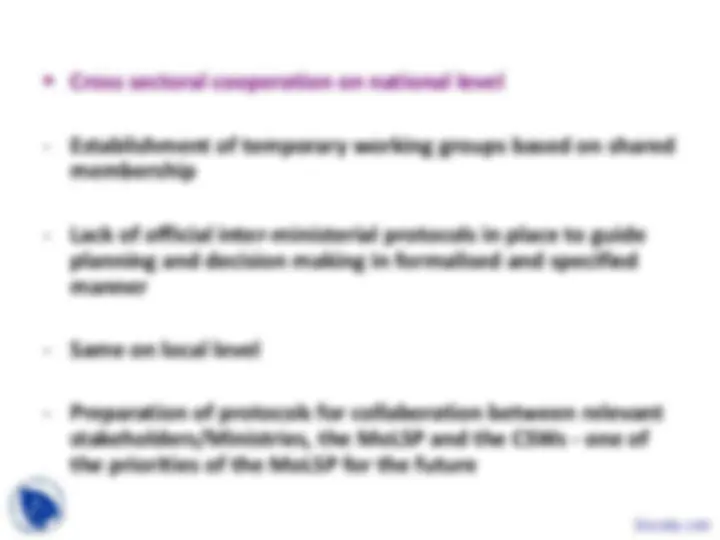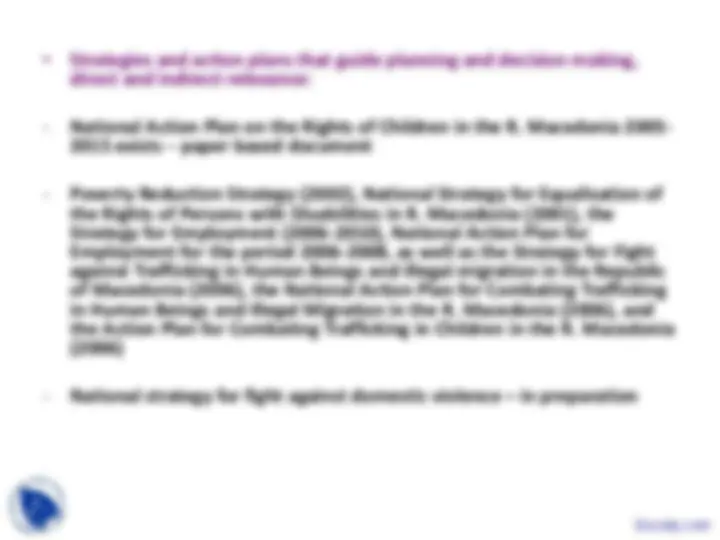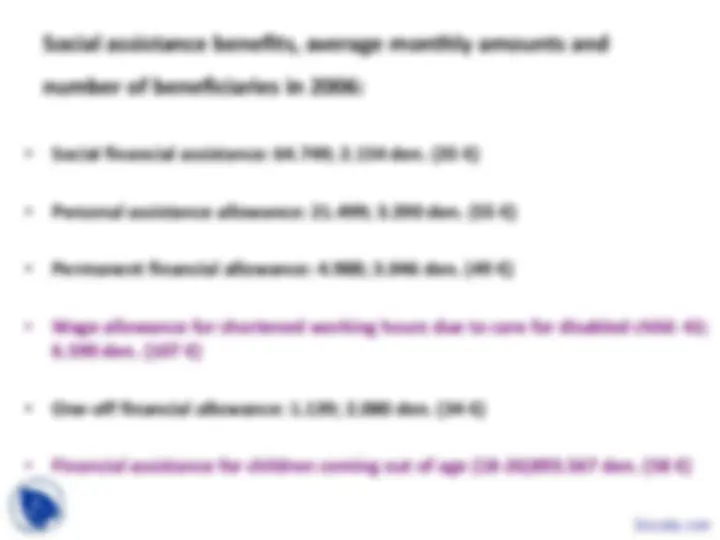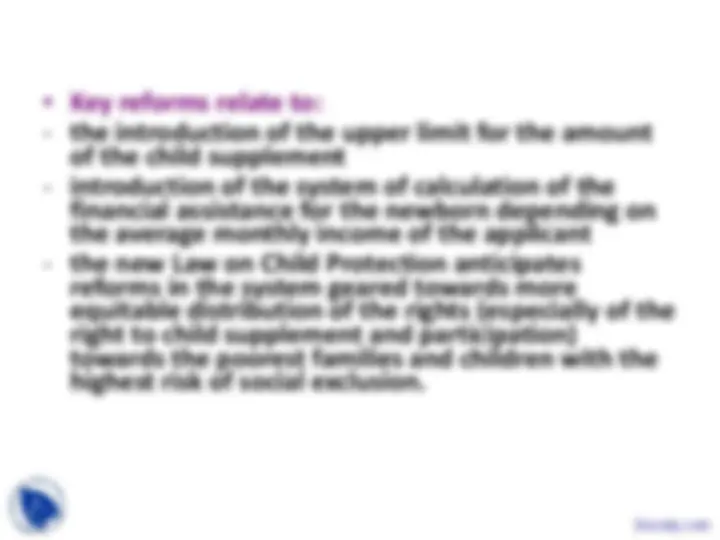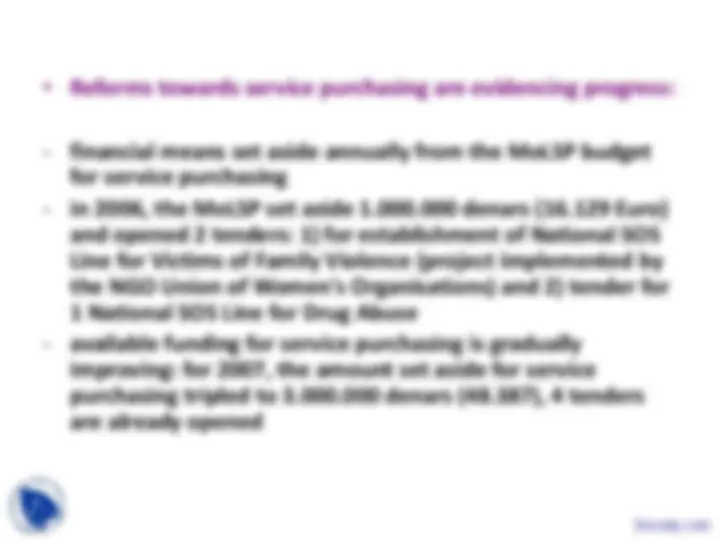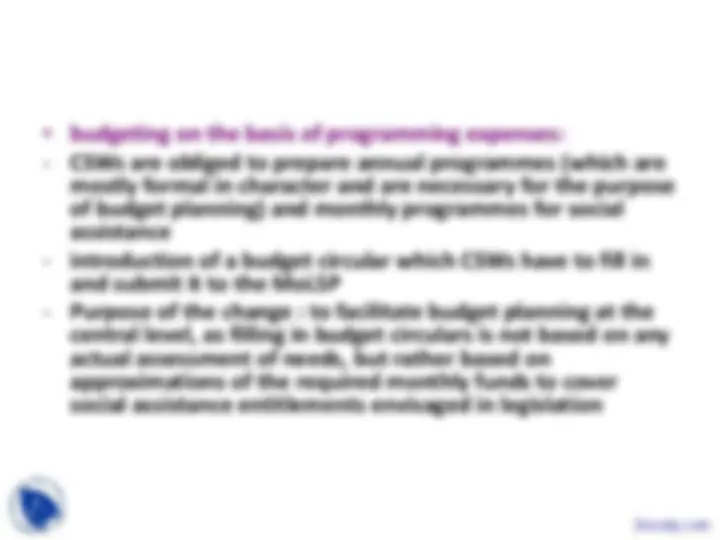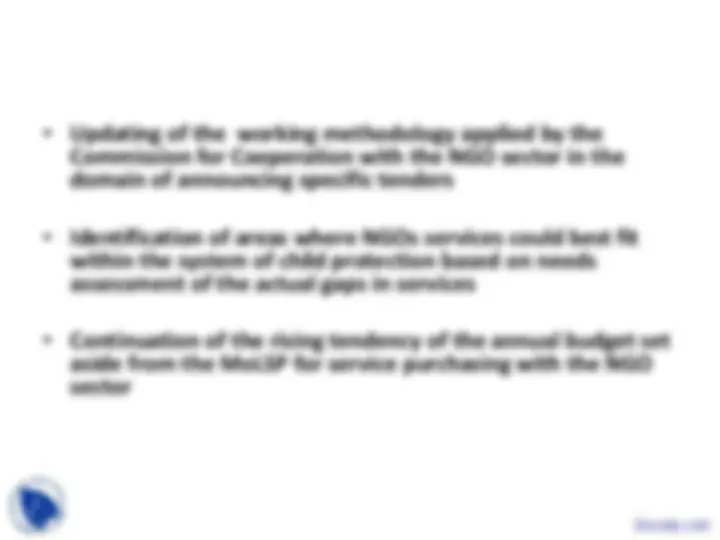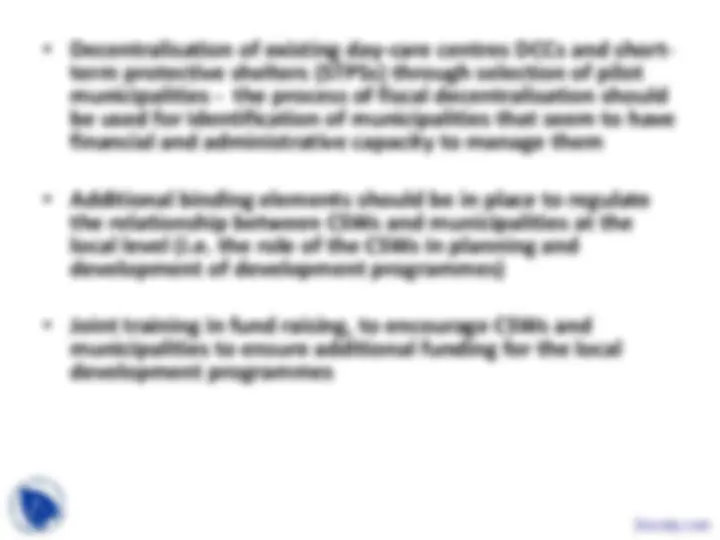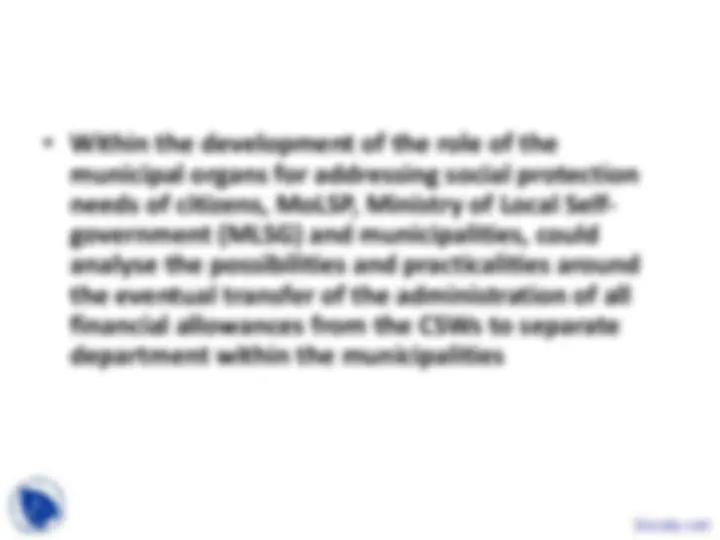Download Financing of Services - Social Legislation - Lecture Slides and more Slides Introduction to Sociology in PDF only on Docsity!
Financing of services and
decentralization
Budgeting and financing
Affected by:
- The (central) role of MoLSP in planning and decision making
- Not subject of a single unit, but fragmented under many, 3 of the 10 Departments involved with different capacities in policy making and planning of the child protection, (Department for Social Protection, Department for Child Protection and Department for Equal Opportunities
- Department for Social Protection - in charge for planning and decision-making regarding the measures of prevention, non- residential and residential forms of protection and the right to social assistance (for the population in general and children in particular)
- Strategies and action plans that guide planning and decision making, direct and indirect relevance:
- National Action Plan on the Rights of Children in the R. Macedonia 2005- 2015 exists – paper based document
- Poverty Reduction Strategy (2002), National Strategy for Equalisation of the Rights of Persons with Disabilities in R. Macedonia (2001), the Strategy for Employment (2006-2010), National Action Plan for Employment for the period 2006-2008, as well as the Strategy for Fight against Trafficking in Human Beings and Illegal migration in the Republic of Macedonia (2006), the National Action Plan for Combating Trafficking in Human Beings and Illegal Migration in the R. Macedonia (2006), and the Action Plan for Combating Trafficking in Children in the R. Macedonia (2006)
- National strategy for fight against domestic violence – in preparation
- Lack of monitoring and evaluation mechanisms:
- impedes the attempts to track down implementation of the
envisaged strategic objectives
- development of Strategies that would subsequently serve as
a basis for operationalisation of concrete steps
- reforms originate from the practice and the need to
advance the protection of specific vulnerable
categories of children (i.e. social assistance for
children coming out of age) or to make child
supplement benefits available to the most needy
families (targeting of child supplements)
Social assistance benefits, average monthly amounts and
number of beneficiaries in 2006:
- Social financial assistance: 64.749; 2.154 den. (35 €)
- Personal assistance allowance: 21.499; 3.390 den. (55 €)
- Permanent financial allowance: 4.988; 3.046 den. (49 €)
- Wage allowance for shortened working hours due to care for disabled child: 42; 6.590 den. (107 €)
- One-off financial allowance: 1.139; 2.080 den. (34 €)
- Financial assistance for children coming out of age (18-26)893.567 den. (58 €)
- Key reforms relate to:
- the introduction of the upper limit for the amount
of the child supplement
- introduction of the system of calculation of the
financial assistance for the newborn depending on
the average monthly income of the applicant
- the new Law on Child Protection anticipates
reforms in the system geared towards more
equitable distribution of the rights (especially of the
right to child supplement and participation)
towards the poorest families and children with the
highest risk of social exclusion.
Social assistance benefits - reforms towards "means-
testing"
- The Social Protection Implementation Project (SPIL),
supported by a World Bank loan, (2004 – 2008) ,initiated the most significant changes in the domain of:
- improved administration and targeting of the social financial
assistance
The objectives of the SPIL for Macedonia:
- to improve the effectiveness and efficiency of social
protection system through improved administration
- long-term sustainability of the pension system
- improved targeting and administration of cash benefits
Services
- Service purchasing based on the principle of pluralism introduced (Law on Changes and Amendments on the Law on Social Protection (65/2004) refers to:
- possibilities for citizen's associations (NGOs) and individuals to become service providers
- besides NGOs, individuals and legal entities, as well as the units of local self-government may establish institutions for social protection (except for CSWs or institutions for protection of children and youth with educational, social, and behavioral problems), and day care centres
- This was introduced to upgrade the quality of services in the domain of social protection through the introduction of the competitiveness in this domain
- Reforms towards service purchasing are evidencing progress:
- financial means set aside annually from the MoLSP budget
for service purchasing
- in 2006, the MoLSP set aside 1.000.000 denars (16.129 Euro)
and opened 2 tenders: 1) for establishment of National SOS Line for Victims of Family Violence (project implemented by the NGO Union of Women's Organisations) and 2) tender for 1 National SOS Line for Drug Abuse
- available funding for service purchasing is gradually
improving: for 2007, the amount set aside for service purchasing tripled to 3.000.000 denars (48.387), 4 tenders are already opened
- Considerable changes in budgeting are required for more flexible and joint financing of reforms :
- the system does not allow for inter-sectoral transfers. Each Ministry, including the MoLSP prepares budget proposal for the following year, which is submitted to the Ministry of Finance. Proposals are then adopted by the Government and enter in Parliament procedures, although most often the budgets in the proposed amounts are not approved. In cases when budget shortages appear as a result of implementation of reform measures, rebalancing of the budget is undertaken, and these re-budgeting requests are usually accepted
Transferring of financing
Decentralization process in social protection:
- Initiated in 2004, carried out in parallel with the decentralisation process in R. Macedonia in general
- Mainly refers to municipalities' possible role as a funder and service provider of a variety of social protection services (residential and day care services)
- Still not taking place in practice due to lack of administrative and financial resources at municipal level
Next steps:
- Overcoming of current fragmentation in planning and decision-making under the responsibility of several departments towards unified policy making, through integration of child protection accountability into a singe department within the MoLSP
- Enhancement of inter-ministerial cooperation through official protocols developed by the relevant Ministries
- Enhancement of capacity building for development of strategic objectives and effective monitoring and evaluation mechanisms for follow-up of their implementation within the MoLSP through staff training
- Updating of the working methodology applied by the Commission for Cooperation with the NGO sector in the domain of announcing specific tenders
- Identification of areas where NGOs services could best fit within the system of child protection based on needs assessment of the actual gaps in services
- Continuation of the rising tendency of the annual budget set aside from the MoLSP for service purchasing with the NGO sector

